英译汉翻译技巧——省略法
- 格式:pptx
- 大小:145.43 KB
- 文档页数:16
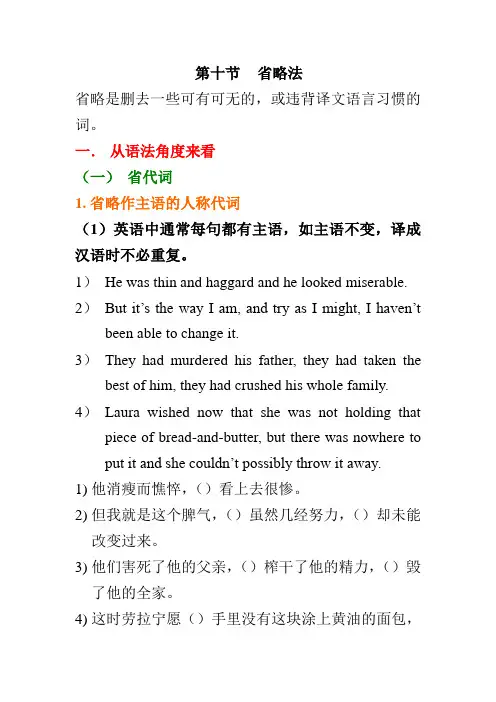
第十节省略法省略是删去一些可有可无的,或违背译文语言习惯的词。
一.从语法角度来看(一)省代词1.省略作主语的人称代词(1)英语中通常每句都有主语,如主语不变,译成汉语时不必重复。
1)He was thin and haggard and he looked miserable. 2)But it’s the way I am, and try as I might, I haven’t been able to change it.3)They had murdered his father, they had taken the best of him, they had crushed his whole family.4)Laura wished now that she was not holding that piece of bread-and-butter, but there was nowhere to put it and she couldn’t possibly throw it away.1)他消瘦而憔悴,()看上去很惨。
2)但我就是这个脾气,()虽然几经努力,()却未能改变过来。
3)他们害死了他的父亲,()榨干了他的精力,()毁了他的全家。
4)这时劳拉宁愿()手里没有这块涂上黄油的面包,拿着又没有地方放,()又不可能扔掉。
作业:1.I am 78 years old; I have been confined to my room with a paralytic stroke for the past 14 months.2. Like his friend he had many wonderful ideas, but he only put a few into practice.3. We can measure the amount of water in a pot, but we can’t measure its heat. We haven’t an instrument for that.4. The Grand Dukes always liked new ideas, and later they were good friends of Galileo.(2)泛指的英语人称代词作主语时,即使是第一个主语,汉译时也可省略。
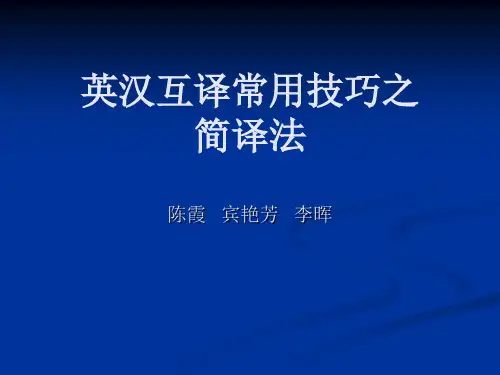
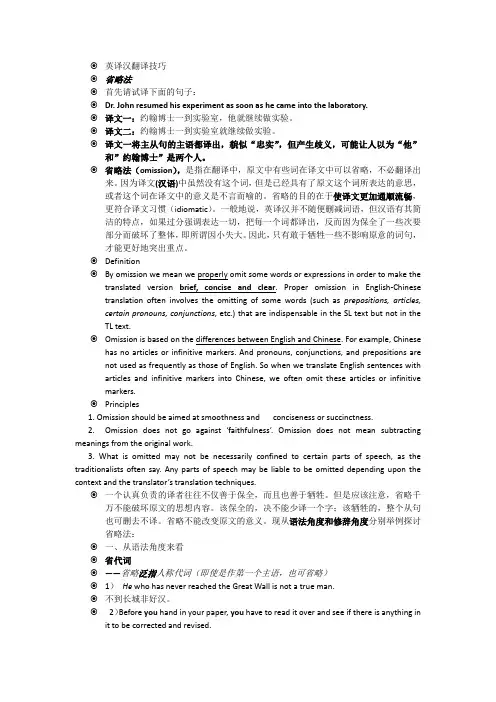
∙英译汉翻译技巧∙省略法∙首先请试译下面的句子:∙Dr. John resumed his experiment as soon as he came into the laboratory.∙译文一:约翰博士一到实验室,他就继续做实验。
∙译文二:约翰博士一到实验室就继续做实验。
∙译文一将主从句的主语都译出,貌似“忠实”,但产生歧义,可能让人以为“他”和”约翰博士”是两个人。
∙省略法(omission),是指在翻译中,原文中有些词在译文中可以省略,不必翻译出来。
因为译文(汉语)中虽然没有这个词,但是已经具有了原文这个词所表达的意思,或者这个词在译文中的意义是不言而喻的。
省略的目的在于使译文更加通顺流畅,更符合译文习惯(idiomatic)。
一般地说,英译汉并不随便删减词语,但汉语有其简洁的特点,如果过分强调表达一切,把每一个词都译出,反而因为保全了一些次要部分而破坏了整体,即所谓因小失大。
因此,只有敢于牺牲一些不影响原意的词句,才能更好地突出重点。
∙Definition∙By omission we mean we properly omit some words or expressions in order to make the translated version brief, concise and clear. Proper omission in English-Chinese translation often involves the omitting of some words (such as prepositions, articles, certain pronouns, conjunctions, etc.) that are indispensable in the SL text but not in the TL text.∙Omission is based on the differences between English and Chinese. For example, Chinese has no articles or infinitive markers. And pronouns, conjunctions, and prepositions are not used as frequently as those of English. So when we translate English sentences with articles and infinitive markers into Chinese, we often omit these articles or infinitive markers.∙Principles1. Omission should be aimed at smoothness and conciseness or succinctness.2. Omission does not go against ‘faithfulness’. Omission does not mean subtracting meanings from the original work.3. What is omitted may not be necessarily confined to certain parts of speech, as the traditionalists often say. Any parts of speech may be liable to be omitted depending upon the context and the translator’s translation techniques.∙一个认真负责的译者往往不仅善于保全,而且也善于牺牲。
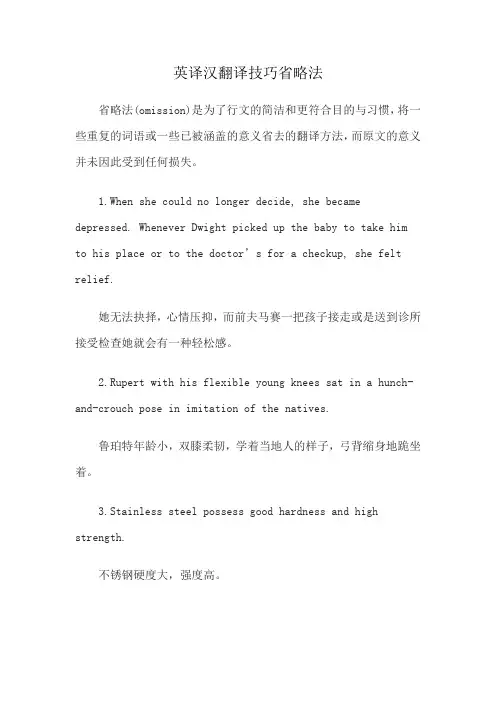
英译汉翻译技巧省略法省略法(omission)是为了行文的简洁和更符合目的与习惯,将一些重复的词语或一些已被涵盖的意义省去的翻译方法,而原文的意义并未因此受到任何损失。
1.When she could no longer decide, she became depressed. Whenever Dwight picked up the baby to take him to his place or to the doctor’s for a checkup, she felt relief.她无法抉择,心情压抑,而前夫马赛一把孩子接走或是送到诊所接受检查她就会有一种轻松感。
2.Rupert with his flexible young knees sat in a hunch-and-crouch pose in imitation of the natives.鲁珀特年龄小,双膝柔韧,学着当地人的样子,弓背缩身地跪坐着。
3.Stainless steel possess good hardness and high strength.不锈钢硬度大,强度高。
4.Penicillin works by not allowing a bacterium to build its cell wall.青霉素的作用是不让细菌制造细胞壁。
5. This is the solid rocky bottom under the ooze and mud of the ocean floor.海底软泥和泥层下面是坚硬的岩石层。
6. There is a 30% increase of our installed capacity with this year.今年,我们的装机容量增加了 30%。
7.在工作中,我们必须避免犯不必要的的错误。
We must avoid making mistakes in our work.8.质子带阳电,电子带阴电,而中子既不带阳电也不带阴电。
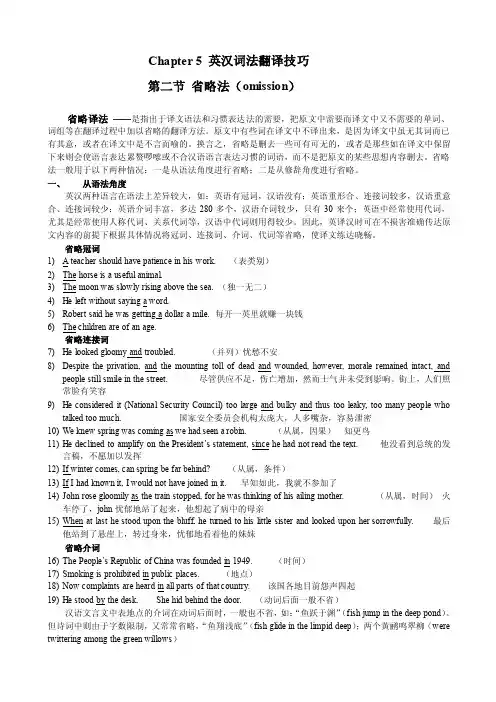
Chapter 5 英汉词法翻译技巧第二节省略法(omission)省略译法——是指出于译文语法和习惯表达法的需要,把原文中需要而译文中又不需要的单词、词组等在翻译过程中加以省略的翻译方法。
原文中有些词在译文中不译出来,是因为译文中虽无其词而已有其意,或者在译文中是不言而喻的。
换言之,省略是删去一些可有可无的,或者是那些如在译文中保留下来则会使语言表达累赘啰嗦或不合汉语语言表达习惯的词语,而不是把原文的某些思想内容删去。
省略法一般用于以下两种情况:一是从语法角度进行省略;二是从修辞角度进行省略。
一、从语法角度英汉两种语言在语法上差异较大,如:英语有冠词,汉语没有;英语重形合、连接词较多,汉语重意合、连接词较少;英语介词丰富,多达280多个,汉语介词较少,只有30来个;英语中经常使用代词,尤其是经常使用人称代词、关系代词等,汉语中代词则用得较少。
因此,英译汉时可在不损害准确传达原文内容的前提下根据具体情况将冠词、连接词、介词、代词等省略,使译文练达晓畅。
省略冠词1) A teacher should have patience in his work. (表类别)2)The horse is a useful animal.3)The moon was slowly rising above the sea. (独一无二)4)He left without saying a word.5)Robert said he was getting a dollar a mile. 每开一英里就赚一块钱6)The children are of an age.省略连接词7)He looked gloomy and troubled. (并列)忧愁不安8)Despite the privation, and the mounting toll of dead and wounded, however, morale remained intact, andpeople still smile in the street. 尽管供应不足,伤亡增加,然而士气并未受到影响。
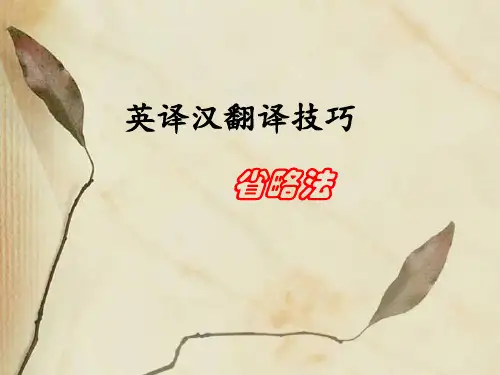
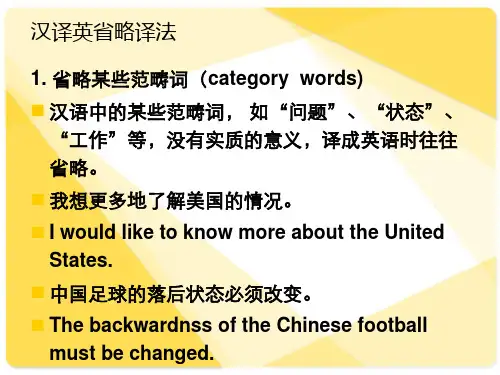
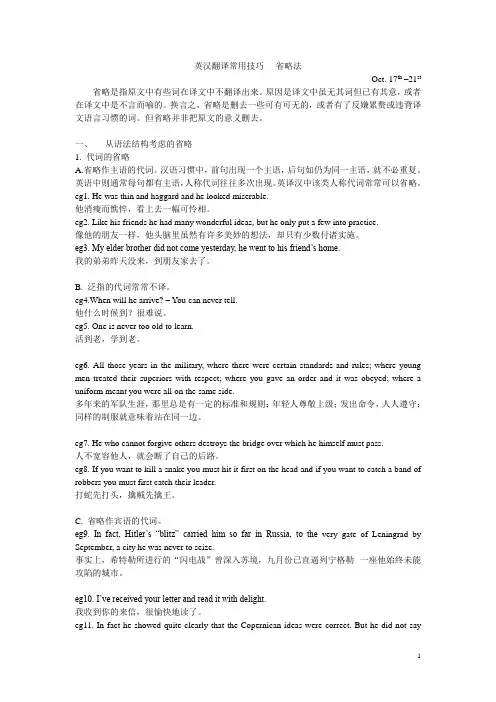
英汉翻译常用技巧----省略法Oct. 17th–21st 省略是指原文中有些词在译文中不翻译出来。
原因是译文中虽无其词但已有其意,或者在译文中是不言而喻的。
换言之,省略是删去一些可有可无的,或者有了反嫌累赘或违背译文语言习惯的词。
但省略并非把原文的意义删去。
一、从语法结构考虑的省略1. 代词的省略A.省略作主语的代词。
汉语习惯中,前句出现一个主语,后句如仍为同一主语,就不必重复。
英语中则通常每句都有主语,人称代词往往多次出现。
英译汉中该类人称代词常常可以省略。
eg1. He was thin and haggard and he looked miserable.他消瘦而憔悴,看上去一幅可怜相。
eg2. Like his friends he had many wonderful ideas, but he only put a few into practice.像他的朋友一样,他头脑里虽然有许多美妙的想法,却只有少数付诸实施。
eg3. My elder brother did not come yesterday, he went to his friend’s home.我的弟弟昨天没来,到朋友家去了。
B. 泛指的代词常常不译。
eg4.When will he arrive? – You can never tell.他什么时候到?很难说。
eg5. One is never too old to learn.活到老,学到老。
eg6. All those years in the military, where there were certain standards and rules; where young men treated their superiors with respect; where you gave an order and it was obeyed; where a uniform meant you were all on the same side.多年来的军队生涯,那里总是有一定的标准和规则;年轻人尊敬上级;发出命令,人人遵守;同样的制服就意味着站在同一边。
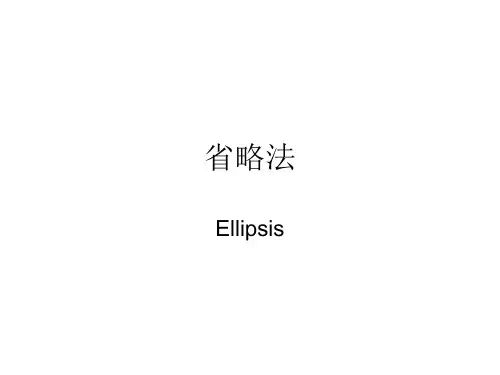
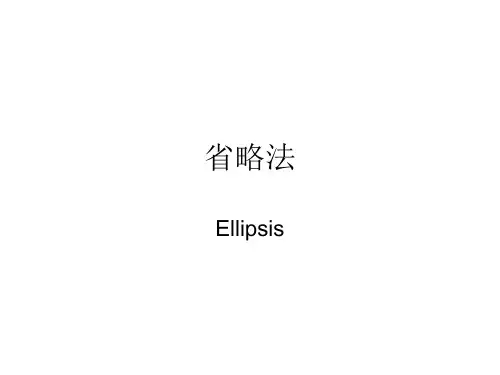
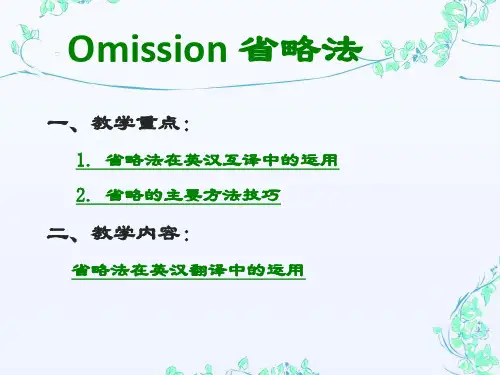
最全英语翻译方法大全(4)译文加上 to begin with (起初,开始时),使上下文逻辑连贯, 加上but when使英语文理通顺。
第三节省略法省略法(Omisssion),是指不译出原文中的某些词。
正如增词法不是随意增加原文的意思一样,省略法也不是要删去原文的意思,而是省去那些在译文中不言而喻的字词,或省去那些译出来反嫌累赘或不合汉语习惯的词语。
一般来说,省略有的是出于结构上的需要,有的是出于修辞上的需要。
现在分类举例说明。
一、英译汉时的结构性省略结构性省略,也称句法省略,主要是省略虚词,如代词,冠词,介词,连词等。
例如:•Follow the river and you will get to the sea.顺藤摸瓜。
(省略代词和冠词)•Let me tell you, time is a very precious gift of God; so precious that He only give it to us moment by moment. He would not have you waste it.让我来告诉你吧,时间是上帝赐予的极其珍贵的礼物。
惟其珍贵,他才一点一点地赐予。
他不愿让你白白浪费。
(省略代词,冠词和介词) •In my childhood, I experienced a great deal about poverty and suffering.童年时代我就体味了贫穷和苦难(省略介词和代词)•We live and learn.活到老,学到老(省略代词)•It is a good horse that never stumbles.好马也有失蹄时。
(或:智者千虑,必有一失)(省略代词)•If winter comes, can spring be far behind?冬天来了,春天还会远吗?(省略连词if)从以上例子可以看出,翻译时虚词的省略可使译文显得简洁,洗练,也符合汉语“形合”的特点。
英译汉翻译技巧——省略法省略法(ellipsis)是英汉翻译中常用的一种技巧,指的是在翻译过程中,将原文中的一些成分或内容省略掉,不翻译出来,以达到简洁明了的效果。
省略法在英汉翻译中非常常用,因为两种语言在表达方式和结构上存在很大的差异,在进行翻译时,适当地运用省略法能够更符合汉语的表达习惯。
一、省略法的分类根据省略的内容和形式,省略法可分为语义省略和结构省略。
1.语义省略语义省略是指在翻译过程中,省略掉原文中的一些内容,但仍然保留了原文的意义。
这类省略可以通过上下文的推理和理解来补足。
例如,原文中的“Do you want some tea?”可以省略为“Want some tea?”这样的表达。
在进行翻译时,我们可以根据前后文的信息,推测出原文主语是“you”,并在翻译中省略掉这个主语,直接翻译为“想要喝点茶吗?”。
2.结构省略结构省略是指在翻译过程中,省略掉原文中的一些句法结构或成分,以便更符合汉语的表达习惯。
例如,原文中的“I'm going to the store, do you want anything?”可以省略为“I'm going to the store, want anything?”这样的表达。
在进行翻译时,我们可以省略掉原文中的助动词“do”和主语“you”,以达到更简洁的表达效果。
二、运用省略法的原则1.保持语意的完整性在运用省略法时,应尽量保持原文语意的完整性,避免省略导致语意不清或解释不明的情况发生。
例如,原文中的“I'm going shopping. See you later!”可以省略为“I'm going shopping. See you!”这样的表达。
虽然省略了“later”,但是通过上下文的推测,读者仍然能够理解原文的意思。
2.保持句子结构的完整性在运用省略法时,应尽量保持句子结构的完整性,避免省略导致句子结构混乱或文法错误的情况发生。
2.2.3 省略法省略法也被称为减词法(pruning)。
跟增词法刚好相反,省略法是指把原文中有的词语省掉不译出来,但省掉的都是一些可有可无的或违背译语语言习惯的词,如实词众的代词、动词的省略,虚词中的冠词、介词和连词的省略等,目的是为了在忠实的基础上使译文更加简洁通顺。
一、由于语法差异而需要省略:1.代词的省略:英语中代词的使用频率远远高于汉语,根据实际情况有时需要把代词所指代的人或事物重复出来,而有时则可以直接省掉,有人称代词(主格或宾格),物主代词等。
例1.Order is order. We cannot complain, we cannot bargain, we cannot question and we cannot suggest changes.命令就是命令,不得抱怨,不得讨价还价,不得置疑,不得建议修改。
例2.One must make painstaking efforts before one can master a foreign language.要掌握一门外语非下苦功夫不可.例3.He put his hands in his pockets and then shrugged his shoulders.他把双手放进衣兜里,耸了耸肩。
例4. A person with nerve damage in the spinal cord can grasp objects when his or her forearms are activated by a device like this one.脊髓神经有损伤的人使用这样的装置后,前臂肌肉被激活,便能抓住东西。
2.It的省略:it作形式主语或宾语,强调句中的it,或表示自然现象、时间、地点、距离等的it常常可以省略。
例:P313.连接词的省略:英语是一种形合的语言,连接词使用较多;而汉语是一种意合的语言,上下文的关系往往是暗含的,所以原文的一些连接词常常可以省略。
第一节省略法所谓省略”并不是把原文的意义删去,而是省略一些可有可无的,或者有了反而显得累赘甚至违背译文语言习惯的词。
一、结构考虑的省略1代词的省略A •省略作主语的代词在英文句子中,作主语的代词较多。
为了使译文前后句子的意思紧凑,避免重复用词,或者为了使译文前后句子的主语能清楚地表示出来,有时可以将作主语的代词省去。
但省去的人称代词在意思上仍明显地包含在译文里。
例如:1) . That is the way I am, and try as I_ might,丄haven ' t been able to change it.但我就是这个脾气,虽然几经努力,却未能改变过来。
Like his friends he had many wonderful ideas, but _he only put a few into practice.2)像他的朋友一样,他头脑里虽然有许多美妙的想法,却只有少数付诸实施。
B. 在英语句子中,泛指的人称代词常常不译出来。
例如:1) One is never too old to learn. 活到老,学到老。
2) They say it ' s so.据说是这样。
C. 作宾语的代词往往也可省略。
在英语句子中,有时作宾语的代词,无论在前面是否提到过,翻译成汉语的时候往往可以不译出来。
例如:1) The following letter will explain itself and needs no apology.下面的话一看就明白,用不着道歉。
2) If you have read these stories, tell them in your own words.如果你读过这些故事,就用自己的话讲出来。
3) The more he tried to hide his warts, the more he revealed them.他越是要掩盖他的烂疮疤,就越是会暴露。